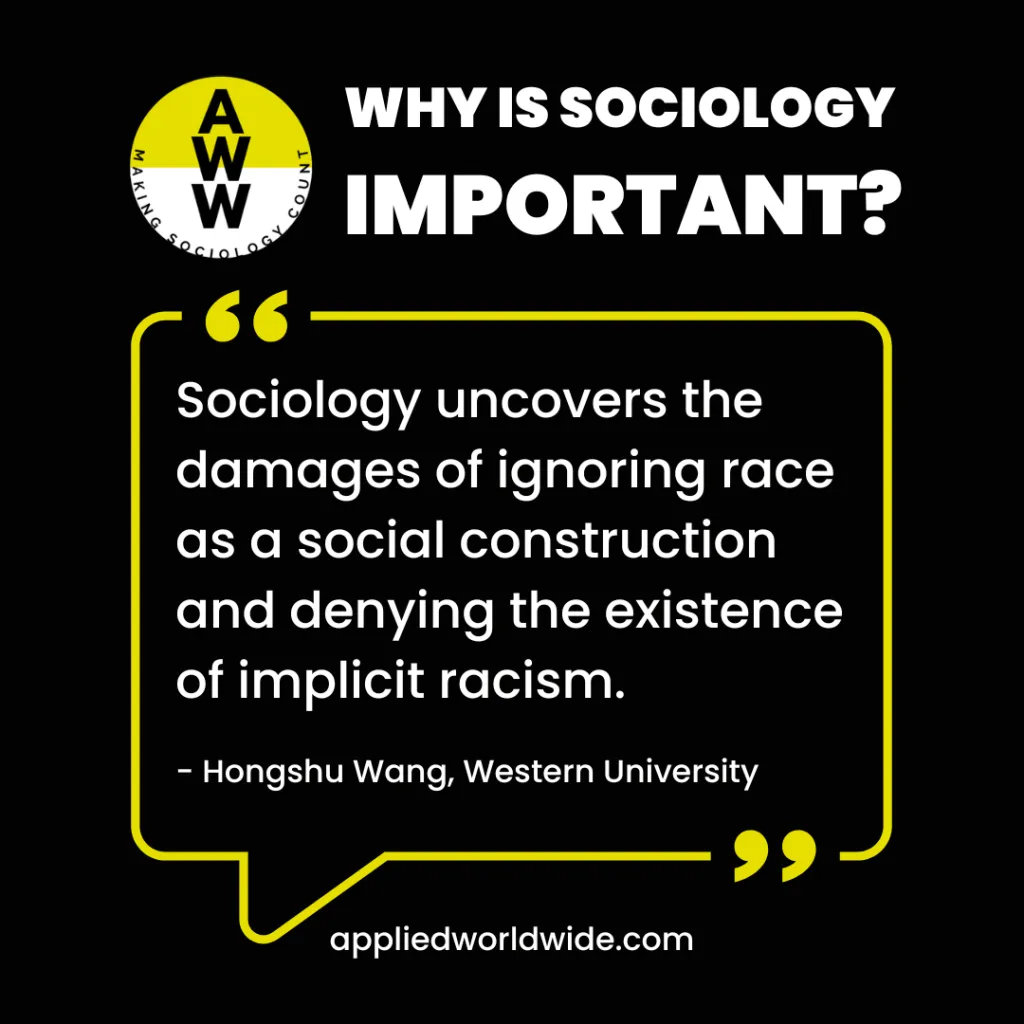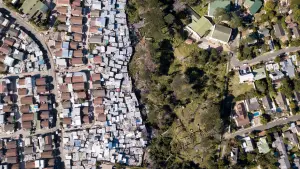Editorial Note
Thank you to our generous sponsors, Sociologists for Women in Society, Center for Equity Education, American Sociological Association’s Section on Sociological Practice & Public Sociology, Hartman Castle Preservation Corporation, Island Acres Resort Motel, Alpha Kappa Delta, Pacific Sociological Association, and the Association for Applied & Clinical Sociology for helping us make Applied Worldwide’s 2024 “Why is Sociology Important?” student essay competition a success!
This essay on the importance of sociological explanations in understanding and addressing anti-Black racism in Chinese social mediae has been published on behalf of Applied Worldwide’s 2024 Global Student Essay Competition. For the 2024 competition, we awarded 16 student essayists across six countries and will be sharing each winning essay in our “Why is Sociology Important?” essay collection.
This sociology essay was written by Hongshu Wang, a recent graduate from Western University in Canada with an Honors Specialization in Sociology and earned a 2nd place prize in the competition.
The Importance of Sociological Explanations in Understanding and Addressing Anti-Black Racism in Chinese Social Media, Hongshu Wang
In Chinese social media platforms, explicit derogatory portrayals of Black people are widespread (Liu & Deng, 2020). Liu (2021) finds that the Chinese government has taken limited actions other than verbally condemning and promising to address anti-Black racism online (Liu et al., 2021). Given that social media platforms, defined as digital sites that provide tools for users to create and share content (Aichner et al., 2021), are where racial ideologies spread and anti-Black racists gather and recruit (Hamilton, 2020), lack of anti-racist actions will likely aggravate the extent of offline anti-Black racism (Gu & Ho, 2023; Ouassini et al., 2022). Consequently, the racism harms the physical and mental health of Black people in China (Miller et al., 2021), particularly Black adolescents, who are the main user group of social media (Tao & Fisher, 2022).
Since social media is not only a space for reinforcing discrimination but also can be a site of empowerment (Miller et al., 2021), addressing anti-Black racism in Chinese social media is thus crucial for achieving racial equity in China. How can we address the issue effectively? I argue that sociology is important for explaining anti-Black racism in Chinese social media through five contributions. First, racism originates from the social construction of race. Second, the sociological perspective highlights the prevalence of anti-Black racism as Chinese social media users’ tendency to maintain privilege in China at the cost of Black people (Bashi Treitler, 2013; Christian, 2019). Third, sociology uncovers the damages of ignoring race as a social construction and denying the existence of implicit racism. Fourth, sociology enables us to understand that racism operates and is reinforced not only at an individual level but also at institutional and structural levels. Fifth, sociology recognizes the possibilities for social changes through human agency. Overall, the sociological perspective provides a comprehensive and accurate view of the issue, which is essential for designing effective anti-racist policy solutions.

Sociological Explanations Reveal the Prevalence of the Issue
To explain the existence and prevalence of anti-Black racism in Chinese social media, we need to understand what race is. Race is a sociological rather than a biological concept because its meaning is inconsistent and differs through time and place (Backhouse, 1999; Bashi Treitler, 2013; Roth, 2016). Often, the meaning of race is constructed by powerful groups to maintain their privileges.
Maintaining Chinese People’s Privileges in China
In this case, Chinese people construct the meaning of race with a tendency to maintain their privileges in Chinese society. Zhou (2023) finds comments in Chinese social media condemning Chinese women who marry foreign people, including Black and white men, as contaminating the Chinese bloodline and nation. The example aligns with Christian’s (2019) and Táíwò’s (2022) arguments that racism has become a global phenomenon; Chinese people, not different from other dominant racial groups in other countries, adopt the racial hierarchy framework developed by the West regarding white people are at the top while racialized groups are inferior in Western countries. Chinese people adjust the racial hierarchy in China by replacing white people and becoming the oppressors of Black communities (Christian, 2019). The frame of social Darwinism, regarding Black people being biologically inferior, has long been adopted by some Chinese intellectuals in the late 19th century (Dikötter, 2015; Gu & Ho, 2023). In recent decades, growing Chinese nationalism is associated with China becoming a rising global power. As indicated by the anti-Black racist narratives, more Chinese social media users believe they are the superior race (Zhou, 2023).
I am not saying all Chinese netizens or Chinese people are racist in the Chinese context, but many are intentionally or unintentionally contributing to anti-Black racism in China because of their indifferences of the issue. I agree with Kendi’s (2019) argument: one who does not identify themselves as an anti-racist is a racist. There is no such middle ground as being a non-racist. Non-racists, who do not commit to anti-racist efforts, are implicitly but clearly maintaining the existing racial inequalities (Kendi, 2019).
To perpetuate the adjusted racial hierarchy in China, Chinese racists and non-racists have also constructed race as a biological concept and deny the existence of implicit racism to derogate and exclude Black people. Many racist comments have claimed that Black people do not deserve equitable policy treatment in China because they are biologically inferior to Chinese people; specifically, the comments frame Black people as causing turmoil, being more likely to commit crimes, being naturally violent, and more likely to be in poverty, often based on negative media portrayals of Black people in Western countries (Gu & Ho, 2023). Other comments explain Black people’s violence as the inferiority of their culture. Some netizens consider that framing a group as culturally inferior sounds less racist compared to explicit racism (e.g., claiming a racialized group is biologically inferior). Still, based on a sociological perspective, implicit racism is a form of racism because it results in the discrimination and disadvantages of Black people (Bonilla-Silva, 2018).
In addition, Chinese netizens’ anti-Black racist comments based on biological and cultural assumptions ignore the other aspect of implicit racism: the historical injustices toward Black people in the global context. Black people have been historically disadvantaged and oppressed in the slave trade and colonization of Africa; the media portrayals of Black people being violent or having financial issues are the results of Black communities having less control or power to manipulate media representation and experiencing more barriers to thrive in countries including China, which is the results of accumulated disadvantages over generations due to the exploitation of the privileged groups: white settlers and white colonizers, rather than the racist idea of biological or cultural inferiority (Táíwò, 2022). As a result of oppressing Black people using racist comments, reinforcing race as a biological concept, and denying the existence of implicit racism, Chinese people’s privileged status in China is less likely to be challenged.
The Operation of Racism in Multiple Dimensions
While uncovering race and racism from a sociological perspective, it is important not only to understand the relevance of race to power contestation but also the operation of racism in multiple dimensions. Golash-Boza (2016), who builds on Huber and Solorzano’s (2015) and Zaami and Madibbo’s (2021) ideas, argues that racism operates on individual, institutional/systemic (examples of social institutions are social media platforms, schools, and workplaces), and structural levels (i.e., multiple institutions) to constantly disadvantages certain racial groups. I argue that anti-Black racism in Chinese social media has become prevalent also due to the operation of institutional and structural racism. The widespread racist posts on multiple Chinese social media platforms reflect institutional racism, meaning that a system or social institution, such as social media platforms, can create, reinforce, or change racial relations that are often associated with inequalities (Golash-Boza, 2016). Then, racist messages created in other institutions can spread to social media platforms intentionally and unintentionally as a feature of structural-level racism. Liu and Deng (2020) find social media working as a platform for anti-Black activists to organize in-person gatherings and distribute anti-Black propaganda on the street. The evidence suggests the bidirectional relationship between social media anti-Black racism and anti-Black racism in other offline institutions. The racist activists’ offline experience will likely shape how they operate anti-Blackracism on social media. Given that social media is a medium where political discourses and ideas can reach many users with relatively few resources required (Ekman, 2019), racism in other institutions can contribute to the prevalence of anti-Black racism in social media. In this way, racist posts on Chinese social media platforms are not only individual actions claimed by many people who do not know or trust sociology but also a reflection of institutional and structural racism.
The Sociological Perspective Informs Solutions to Anti-Black Racism
The sociological perspective not only calls for investment in finding solutions, but the perspective itself can also inform effective policy implications. As van Dijk (1984) and Joseph and Golash-Boza (2021) state, understanding the causes of the issue is a prerequisite to solving it. The sociological explanations of the issues I have identified in my paperhelp to address anti-Black racism in Chinese social media: knowing that Chinese netizens tend to discriminate against Black people for maintaining Chinese people’s privileges in China, as well as knowing the operation of racism in not only individual or institutional but structural dimensions, policymakers can then find solutions for Chinese social media users to understand race as a social construction manipulated by powerful groups, the harmful consequences of their tendency of maintaining privileges and discriminating Black people, and the existence and harm of implicit racism that reinforces the disadvantaged status of Black people. Additionally, policymakers should design solutions at structural levels for more effective treatment of racism. They should not merely pay attention to racism on social media platforms but ignore the reinforcement of anti-Black racism in other offline institutions.
Still, I argue that understanding the issue is not enough to solve the issue. Taking actions, particularly long-term rather than temporary anti-racist actions (Wang, 2024), is important and required to challenge the reality of anti-Black racism in multiple dimensions (Delgado & Stefancic, 2023; Zaami & Madibbo, 2021). The sociological perspective does pay attention to social forces or structures that constrain peoples’ actions, but that does not mean we should ignore the value of agency, a key sociological concept defined as people’s capacity to make decisions and impact societies (Symbaluk & Bereska, 2019). The idea of agency suggests that creating changes is possible. Also, effective use of human agency for creating positive changes requires collective actions, such as writing anti-racist articles to raise public awareness, pressuring racist social media platforms to enforce anti-racist guidelines, using sociological perspectives and evidence based on empirical findings to validate the needs for policy solutions informed by sociological perspectives, and encourage changes happening not only in social media platforms but other social institutions like schools, workplaces, and governments. Everyone should reflect on ways they can use their agency, become an anti-racist, and take collective actions to make anti-racist efforts in China as well as in other countries!
Conclusion
In this paper, I argue for the usefulness of sociology in explaining a severe issue in Chinese society: the prevalence of anti-Black racism in Chinese social media platforms. A sociological lens can contribute to a comprehensive and accurate understanding of the issue. From this lens, one can observe the prevalence of the issue as Chinese racists and non-racists’ tendency to accumulate privileges through adjusting the Western racial hierarchy framework and then making Chinese people superior and Black people inferior in China, as well as reinforcing the racial inequalities in Chinese social media by constructing race as biological and implicit racism as non-existent. The sociological explanations of racism operating and spreading in multiple dimensions also suggest the severity of the issue and addressing racism in multiple dimensions as a more effective solution. The sociological idea of agency implies that social change is possible. Everyone should use their agency to become anti-racist and take anti-racist actions in China as well as in other countries!
References
- Aichner, T., Grünfelder, M., Maurer, O., & Jegeni, D. (2021). Twenty-five years of social media: a review of social media applications and definitions from 1994 to 2019. Cyberpsychology, behavior, and social networking, 24(4), 215-222. https://doi.org/10.1089/cyber.2020.0134
- Backhouse, C. (1999). Colour-coded: a legal history of racism in Canada, 1900-1950. University of Toronto Press
- Bashi Treitler, V. (2013). The ethnic project: Transforming racial fiction into ethnic factions. Stanford University Press.
- Bonilla-Silva, E. (2018). Racism without racists: Color-blind racism and the persistence of racial inequality in America(5th ed.). Rowman & Littlefield Publishers.
- Christian, M. (2019). A global critical race and racism framework: Racial entanglements and deep and malleable whiteness. Sociology of Race and Ethnicity, 5(2), 169-185. https://doi.org/10.1177/2332649218783220
- Dikötter, F. (2015). The discourse of race in modern China. Oxford University Press.
- Delgado, R., & Stefancic, J. (2023). Critical race theory: An introduction (4th ed.). NYU Press.
- Ekman, M. (2019). Anti-immigration and racist discourse in social media. European Journal of Communication, 34(6), 606-618. https://doi.org/10.1177/0267323119886151
- Golash-Boza, T. (2016). A critical and comprehensive sociological theory of race and racism. Sociology of race and ethnicity, 2(2), 129-141. https://doi.org/10.1177/2332649216632242
- Gu, J., & Ho, J. (2023). Anti-Black sentiments in Chinese Weibo discourse: a critical discourse historical analysis. Social Semiotics, 1-24. https://doi.org/10.1080/10350330.2023.2210506
- Hamilton, A. M. (2020). A genealogy of critical race and digital studies: Past, present, and future. Sociology of Race and Ethnicity, 6(3), 292-301. https://doi.org/10.1177/2332649220922577
- Huber, L. P., & Solorzano, D. G. (2015). Racial microaggressions as a tool for critical race research. Race Ethnicity and Education, 18(3), 297-320. https://doi.org/10.1080/13613324.2014.994173
- Joseph, T., & Golash-Boza, T. (2021). Double consciousness in the 21st century: Du Boisian theory and the problem of racialized legal status. Social Sciences, 10(9), 345. https://doi.org/10.3390/socsci10090345
- Kapralski, S. (2016). The evolution of anti-gypsyism in Poland: From ritual scapegoat to surrogate victims to racial hate speech? Polish Sociological Review, 193(1), 101-117. https://www.ceeol.com/search/article-detail?id=411547
- Kendi, I. X. (2019). How to be an antiracist. One world.
- Liu, T., & Deng, Z. (2020). “They’ve made our blood ties black”: On the burst of online racism towards the African in China’s social media. Critical Arts, 34(2), 104-107. https://doi.org/10.1080/02560046.2020.1717567
- Liu, T., Xu, M., & Chen, X. (2021). Social media, gendered anxiety, and disease-related misinformation: Discourses in contemporary China’s online anti-African sentiments. Asian Journal of Communication, 31(6), 485–501. https://doi.org/10.1080/01292986.2021.1941150
- Miller, G. H., Marquez-Velarde, G., Williams, A. A., & Keith, V. M. (2021). Discrimination and Black social media use: Sites of oppression and expression. Sociology of Race and Ethnicity, 7(2), 247-263. https://doi.org/10.1177/2332649220948179
- Ouassini, A., Amini, M., & Ouassini, N. (2022). #ChinaMustexplain: Global tweets, COVID-19, and anti-Black racism in China. The Review of Black Political Economy, 49(1), 61-76. https://doi.org/10.1177/0034644621992687
- Roth, W. D. (2016). The multiple dimensions of race. Ethnic and Racial Studies, 39(8), 1310-1338. https://doi.org/10.1080/01419870.2016.1140793
- Symbaluk, D., & Bereska, T. (2019). Sociology in Action: A Canadian perspective (3rd ed.). Nelson Education.
- Táíwò, O. O. (2022). Reconsidering reparations. Oxford University Press.
- Tao, X., & Fisher, C. B. (2022). Exposure to social media racial discrimination and mental health among adolescents of color. Journal of youth and adolescence, 1-15. https://doi.org/10.1007/s10964-021-01514-z
- van Dijk, T. A. (1984). Prejudice in discourse: An analysis of ethnic prejudice in cognition and conversation. John Benjamins Publishing.
- Wang, H. (2024). Addressing Racism in Canadian Neoliberal Academia from a Sociological Perspective. The Sociological Imagination Undergraduate Journal, 9(1), 1-8. https://ojs.lib.uwo.ca/index.php/si/article/view/17993/14095
- Zaami, M., & Madibbo, A. (2021). “You don’t sound black” African immigrant youth experiences of discrimination in the labor market in Calgary. International Journal of Intercultural Relations, 83, 128-138. https://doi.org/10.1016/j.ijintrel.2021.06.003
- Zhou, Z. B. (2023). Patriarchal racism: the convergence of anti-blackness and gender tension on Chinese social media. Information, Communication & Society, 1-17. https://doi.org/10.1080/1369118X.2023.2193252
Meet our 2023 Global Student Essay Competition Sponsors!

Sociologists for Women in Society is a nonprofit professional feminist organization dedicated to:
- Transforming the academy and professional organizations, including our own, by actively supporting feminist leadership and advancing career development of feminist scholars.
- Recognizing that structural inequalities impact those marginalized by their identities and that this requires proactively promoting the creation of inclusive institutional spaces in an ongoing manner and by practicing critical reflexivity.
- Advocating and encouraging the development of sociological feminist theory rooted in intersectionality and cutting-edge research for publication and dissemination.
- Promoting social justice research within local, national, and international activist spaces by supporting scholar-activist communities seeking to dismantle intersecting systems of oppression.

The Center for Equity Education (CFEE), established in 2020 as a 501(c)(3) nonprofit, addresses a gap in expert-led education for organizations, especially those with limited resources. At CFEE, our mission revolves around empowering organizations with comprehensive knowledge on federal and state civil rights, specializing in harassment and discrimination, including sexual harassment.

Hartman Castle Preservation Corporation, a 501c3 non-profit, is a A community grassroots movement formed to purchase and preserve the Hartman Castle in Gunnison, CO

The purpose of the American Sociological Association’s Section on Sociological Practice and Public Sociology is to advance sociologically-informed research and practice, to further public discussion of sociological issues, and to promote the use of sociology to inform public policy.

Island Acres Resort Motel is a restored authentic 1950s lodging property in the style of the tourist court motel. Embracing the appeal of a bygone era, where history blends with hospitality.

Alpha Kappa Delta, the International Sociology Honor Society, seeks to acknowledge and promote excellence in the scholarship in the study of social problems, sociology, and intellectual activities that lead to the improvement in the human condition.

The Pacific Sociological Association is committed to serving sociologists, faculty, applied professionals, and students. We strive to create a professional community that reflects the diversity of our region and enhances the diversity of our discipline. We are committed to inclusivity and equity in our organization, to promoting social justice by examining and challenging the structural and institutional barriers in our discipline, and to building pathways for the next generation of sociologists.

The Association for Applied and Clinical Sociology (AACS) promotes applying social scientific knowledge and methods to develop constructive solutions. We provide educational, programmatic, mentoring, networking, and policy resources in a supportive professional community.







